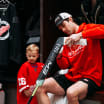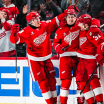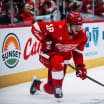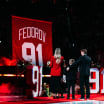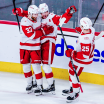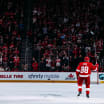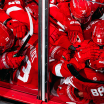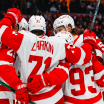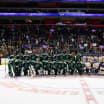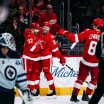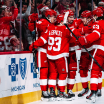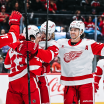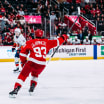Living through a season like the Red Wings just did is not easy for anyone but as with most difficult things, there is a silver lining.
One of those positive aspects of this past season was the growth of many of the young players.
Notes: Young Wings took step forward
Hronek, Zadina impressive; Seider, Veleno on the way
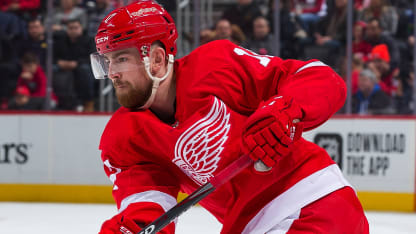
© Dave Reginek/Detroit Red Wings
By
Dana Wakiji @Dwakiji / DetroitRedWings.com
"Some of it we'll see in future years," Wings coach Jeff Blashill said on a Zoom conference call Thursday. "We talked about the growths from struggle and sometimes that's your best growth and I think it's hard to see where that direct growth is until you learn from those trials and tribulations and you apply them in the future. (Filip) Hronek had an opportunity to have a lot of ice time, was in a really expanded role when we lost Danny DeKeyser basically for the season early on. That really put Filip into an even more extended role and he did a good job of it, he managed it. There were ups and downs but when you get that much that early in your career you're going to go through some dry spells where your game isn't going to be and there's no safety net because of the thinness that we have back there. But I think he's one I thought grew."
Hronek, who won't even turn 23 until November, played 65 games and had 31 points (9-22-31), first among defensemen.
Only Dylan Larkin (53 points), Tyler Bertuzzi (48 points) and Anthony Mantha (38 points) had more. Robby Fabbri also had 31 points in just 52 games.
Hronek also led the team in average ice time at 23:54. DeKeyser averaged 22:04 in eight games and Patrik Nemeth averaged 22:02 in 64 games.
"Filip Zadina had an opportunity to come in and play pretty good minutes," Blashill said. "Until he got hurt I thought he was doing a good job. I think he was starting to take steps in the right direction, he looked more confident, more dangerous as an offensive player. I think he does a pretty good job of defensive responsibility, but I wanted to see a more dangerous offensive player and I think as the year went on we saw that, without taking unneeded risk. So that's a growth part with him."
Filip Zadina is our @Xfinity Player of the Week because we can't get enough of this shot. 🔥🔥🔥 pic.twitter.com/Fcf9YfdaBM
— Detroit Red Wings (@DetroitRedWings) January 6, 2020
Zadina, 20, finished with 15 points (8-7-15) in 28 games before suffering a broken ankle.
Larkin, who once again led the team in scoring, was also enthused about some of the players who are even younger than he is.
"The exciting part is there's quite a few of them," Larkin said on the call. "You got all the guys that didn't even get a chance in Grand Rapids that I got to see in training camp. Moritz Seider and Joe Veleno, Ras (Michael Rasmussen) was down there for a little bit, we've seen him in Detroit. It seems like he took a step in the right direction playing center. The other two that I mentioned are just trying to find their footing but also really helped that team down there.
"I was very impressed with the demeanor of Gustav Lindstrom when he came up, the kind of player he is is someone I love being on the ice with. Zadina came up and he started playing really well and was dangerous. The more and more he was on the ice, he was more dangerous, really that goal-scoring threat that we need pretty badly. These guys are developing, they're developing into good NHL players and that's huge for our team. I think those two guys, they're all a big part of the future, so we need them to take a huge step this summer in the gym and make sure they're ready to go next season."
It would have been beneficial for the Wings to have prospects like Seider, Veleno and Rasmussen, plus Dennis Cholowski, Taro Hirose, Givani Smith and Evgeny Svechnikov go through a long playoff run with the AHL's Grand Rapids Griffins but the AHL canceled the rest of its regular season and playoffs.
"One way to grow is through experience, and experience is something that you can't teach, you have to live it," Blashill said. "I do think that's what lost. What can be gained from it is also important to look at. We'll have a unique situation to add strength, to maximize our bodies to degrees we normally wouldn't have, we'll have opportunities once we all can get back on the ice on a regular basis to put in the hours needed to acquire certain skills, to put those repetitive drills in place and practice them over and over so guys can acquire those new skills.
"I think it also gives us a great opportunity to have more time than ever to maximize our bodies and maximize our games. That's what we're going to have to look at and it's going to be real important for our young players."\
STRUGGLE FOR GLENDENING
Luke Glendening served as a Wings alternate captain for the first time this past season.
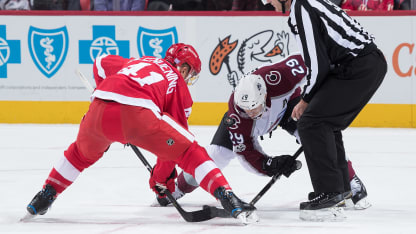
© Dave Reginek/Detroit Red Wings
It was not an easy time to be a member of the Detroit leadership group.
"I think it's just facing the media after a tough loss and trying to find answers when things aren't going well. I thought that was pretty difficult," Glendening said on the call. "I'm not a huge vocal guy, I try to speak when I need to, but try to use my work ethic and lead by example in that respect. I didn't have a great year personally so that was frustrating to me. When you have a leadership role, you want to be contributing more on the ice and I didn't do that so that was frustrating for me for sure."
In 60 games, Glendening had six goals and three assists, off his career-best 23-point mark (10-13-23) in 78 games during the 2018-19 season.
Glendening did continue his mastery in the face-off circle, leading the team at 56.1 percent.
NO FANS
When the NHL playoffs do start, they will be doing so in hub cities in front of no fans.
That is likely to be the case when the 2020-21 season starts in every NHL city.
"It's definitely going to be different but I think most importantly everyone, all the players want everyone to be safe," Glendening said. "And if that's what it takes to keep people safe at this moment, I said this before we stopped playing but sports don't exist in a vacuum and we're at the same risk and the fans that would come in would be at the same risk. So if that's what it takes to keep people safe, but we can still entertain on television or live streaming on the internet, whatever that might be, that's the best case scenario."
Larkin said it was something the players could get accustomed to, even though it would be strange at first.
"I don't see a problem with it," Larkin said. "Obviously in the playoffs it's so exciting with fans and you want to have the support you have from your home crowd but when you drop the puck and there's five guys against you on the other side, you want to have the edge and you want to win. I don't see it as a problem. I think after the first couple shifts, you'll get used to it."
In addition to having the fans there cheering, there is often a lot of interaction that goes on during the pre-game warmups, going on and off the ice and at other times.
That will also be missed.
"I talked about how life is about experiences, it's about emotions, it's about sharing those experiences," Blashill said. "A lot of times it's about sharing the emotion of wins and losses, not only with your team, but with the fans and the fanbase and that's what makes it great. I watched Hoosiers the other night with my youngest son and to see the fans come out of the stands in 1952 or whenever and they're hugging each other and everybody is on the court, those are great, great moments. That's living, that's awesome. That's what we all want. To get to those highs you got to have lows and we've experienced a lot of the lows. That's what makes sports great, the shared experiences. So we'd love to get back to that.
"I don't know how, I don't know if it's going look a little bit different but I know it's an integral part of why we play sports. It's more than just entertainment on a screen, it's being involved with the interaction between fans and players and coaches. Somehow, some way we have to continue to capture that. Will it be different? Probably. But we have to find ways to capture that. It's a new day every day as we learn more about this virus and hopefully, we can get to a point where we can all get back closer to where we were three, four months ago, to that normal. But I know without a shadow of a doubt the integration of fans and emotions in athletes is integral to sports and it's got to, at some point, we have to find ways to make sure that happens."
PERSONAL CONNECTION IN COVID-19 CRISIS
Blashill might be the most visible member of his family as coach of the Red Wings but he would likely say he doesn't have the most important job, especially during a pandemic.
"My oldest sister, Lisa, is in charge of a number of counties, Traverse City's health department. She runs the health departments up there," Blashill said. "They've had a lot of challenges from Day 1. When our league got shut down she went into overdrive and very proud of everything I've been told, how they've worked, how they've handled it, try to make sure they keep it contained. The northern part of Michigan is different than down here, in the sense that they say medical resources aren't available and yet a lot of times, and I'm sure that happened a little bit this weekend, their population grows an enormous amount, so they have a lot of challenges.
"So I'm really proud of the job my sister has done. She's had to make hard decisions, had people disagree with her, had people second guess her decisions. That's what making decisions is about. You don't always make the perfect one, especially when the world around you is changing, but you got to make them and you go to move forward. The people I've talked to up there said she's done a great job and I'm real proud of her."



